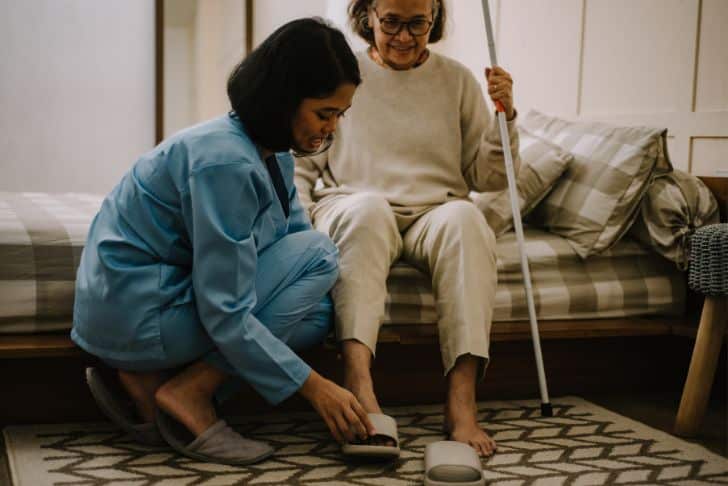Embracing the reality of dementia at home is a massive undertaking, with 5.8 million people in the U.S known to be living with this condition — many in the later stages of the disease. Indeed, navigating the responsibilities of caregiving can be a daunting journey, often leading to emotional and financial strain for family and friends. However, research by John Hopkins suggests that 97% to 99% of caregivers and their patients have unmet dementia-related care needs. As such, a supportive approach towards managing dementia at home is of paramount importance – understanding the diagnosis, making home safety adjustments, scheduling self-care for caregivers, reaching out to dementia care coordinators, and exploiting available community resources. As much as many patients prefer to stay at home through all stages of dementia, never shy away from contemplating alternatives like retirement homes or 55 and older communities, should the need arise.
Understanding Dementia Diagnosis
Discussing the importance of understanding dementia
Coming to terms with a dementia diagnosis can be an emotional and challenging process. Yet, understanding the details about dementia is a pivotal step in preparing for what lies ahead. Knowledge equips you to better understand the changes your loved one is experiencing and prepare for the care needs they will likely have. It also helps to illuminate the path forward and guides the decisions you will need to make. The availability of resources and education from various Alzheimer’s support organizations can be of immense help in comprehending dementia, thus encouraging a greater acceptance of the diagnosis and its resultant realities.
Steps to take after receiving a dementia diagnosis
Upon receiving a dementia diagnosis, the array of emotions can often be overwhelming. However, it’s crucial to take some structured steps to manage the situation effectively. Start by educating yourself and your family about dementia—its symptoms, progression, and impact. Next, keep the lines of communication open with your loved ones, providing them support while also accepting the help they offer. Schedule regular medical appointments for your loved one and start considering long-term care plans. It’s also beneficial to pursue legal and financial planning to mitigate future obstacles.
Making Home Modifications
Simple home modifications to enhance safety
Creating a safe and comfortable environment for dementia patients involves making some simple yet effective modifications at home. Things like installing grab bars in the bathroom, securing rugs to prevent falls, and locking away items such as weapons can significantly reduce potential hazards. You can also consider labeling cupboards and drawers and setting up a routine area for essentials like keys and wallets, making their environment more navigable.
Using technology for improved home safety
Technology has become an indispensable asset in providing improved home safety for dementia patients. You can use GPS trackers, automatic timers for lights and appliances, and sensor alarms that notify you of unusual activity or inactivity. Utilizing these technologies not only enhances a person’s safety but also provides reassurance for the family and caregivers.
Addressing specific hazards for dementia patients
People with dementia face certain risks that require careful attention. Confusion, forgetfulness, and impaired judgment can lead to accidents if specific hazards are not addressed. Such hazards can be mitigated through simple yet essential steps like removing locks from interior doors, lowering hot water temperatures to prevent scalding, avoiding cluttered walkways, and removing unstable furniture.
The Role of a Dementia Care Coordinator
Understanding the role and benefits of a care coordinator
A dementia care coordinator can play an invaluable role in managing the complex care needs of individuals with dementia. Acting as a dependable liaison, care coordinators maintain open lines of communication between all parties involved, ensuring everyone is aware of the medical status and needs of the individual with dementia. They can assist with medication management, nutritional needs, and address safety concerns. Having a care coordinator can prove to be a beneficial resource, leading to improved patient outcomes and burden relief for caregivers.
Services provided by dementia care coordinators
Dementia care coordinators provide a wide array of services tailored to the unique and changing needs of each individual. They offer comprehensive medical attention, including observing symptoms, ensuring medical appointments are kept, and managing medications. These coordinators also handle nutritional considerations, helping with meal planning and dietary restrictions. They act as safety advocates, ensuring the home environment is secure and tailored to the person’s changing abilities. Lastly, dementia care coordinators provide emotional support and counseling, helping families navigate their journey with dementia.

Embracing Medical Alert Programs
Overview of medical alert programs
Medical alert programs serve as a security measure for those with dementia. These programs typically provide a wearable device, such as a bracelet or pendant, which triggers an alert in case of emergencies like falls. Some devices even come equipped with GPS tracking, ensuring swift assistance in case the individual wanders off.
Benefits of medical alert programs for dementia patients
These systems offer numerous benefits to dementia patients and their caregivers. They provide an added layer of security, especially during the night or when the caregiver is not present. Furthermore, they can enable individuals with early or moderate dementia to maintain a level of independence while also providing peace of mind for their loved ones.
Choosing the right medical alert program
When selecting a medical alert program, consider factors such as the individual’s specific needs, the features offered by the alert system, its cost, and its reputation for reliability and service. Always ensure that the program provides 24/7 support and that the alert device is easy to wear and use.
Supporting Caregiver Wellness
Understanding the importance of caregiver health and wellness
Caring for someone with dementia can be both rewarding and challenging. However, the constant demand for attention and care can leave the caregiver feeling drained, making it crucial to prioritize their health and wellness. Healthy caregivers are better equipped emotionally, physically, and mentally to provide the required care.
Effective strategies for caregiver self-care
Strategies like regular exercise, a balanced diet, and adequate sleep can significantly improve a caregiver’s wellbeing. Carving out time for relaxation and recreational activities like reading, gardening, or crafting can help in maintaining mental health. It’s also essential to stay socially connected and regularly consult with a healthcare provider to manage stress better.
Preventing caregiver burnout
Preventing caregiver burnout involves recognizing the signs early on and taking proactive steps to address them. Burnout can manifest as physical exhaustion, mental fatigue, or loss of interest in activities once enjoyed. To fight burnout, don’t hesitate to seek help. Utilize support groups, counseling, and respite care services. Remember, taking care of yourself helps you provide better care to your loved one.
Engaging Local Community Services
Beneficial local services for caregiver support
Utilizing local community services can relieve some of the stress faced by caregivers. Many communities offer adult daycare centers that provide stimulating activities for dementia patients and respite for caregivers. In-home health aides can assist with personal care and housework, while meal services can reduce the time and effort required to prepare nutritious meals.
The role of adult daycare centers and meal services
Adult daycare centers provide supervised care for dementia patients in a safe, stimulating, and social environment. These centers also offer therapeutic and recreational activities, meals, and sometimes even health services. Similarly, meal services deliver healthy, prepared meals to your home, easing the daily burden of meal preparation.
Enlisting the assistance of in-home health aides and nursing assistants
In-home health aides and nursing assistants can provide much-needed support for caregivers by assisting with personal cares, such as bathing and dressing, and light household duty tasks. In addition, these professionals often have training in managing behavior symptoms of dementia and can often provide companionship to the individual, thereby enhancing their quality of life.
Consideration of Nursing Homes and Assisted Living
Benefits and drawbacks of nursing homes and assisted living
While many people with dementia continue to live at home during all stages of the disease, nursing homes and assisted living residences might be more suitable for some depending on individual and family needs. These facilities offer round-the-clock care, healthcare services, meals, and social activities in a secure environment. However, they also have potential drawbacks like high costs, lack of personalized care, and the emotional hardship of being away from familiar surroundings and loved ones.
Evaluating personal and family needs for residential care
The decision to move your loved one to a nursing home or assisted living facility should be based on their needs, the caregiving capabilities of the family, and what’s in their best interest. Considerations should include the severity of dementia, the individual’s safety, health, and quality of life, caregiver’s well-being, and the financial implications.

Evaluating Retirement Community Options
Understanding the benefits of a 55 and older or retirement community
Retirement communities, particularly those designed for 55 and older, come equipped with a plethora of amenities and tailored care for those with dementia. Residents can enjoy the benefits of community living—social activities, shared meals, and group outings, along with the peace of mind that comes from living in a safe and secure environment.
Factors to consider when choosing a retirement community
When considering a retirement community, think about the level of care your loved one needs and whether the community can meet these needs now and in the future as dementia progresses. Other factors include the cost, location, availability of amenities, opportunities for socialization, and feedback from current residents.
Financial Implications of Dementia Care
Understanding the financial burden of home-based dementia care
Home-based dementia care can come with significant financial implications. These can range from the cost of home modifications and hiring in-home care to the expenses associated with adult daycare centers or medical alert systems. Not to mention the possible lost income from cutting back on work hours or even quitting a job to provide care.
Financial support and resources available for dementia caregivers
There are several resources available to help ease the financial burden of dementia care. These might include Medicare, Medicaid, veterans’ benefits, and long-term care insurance. Local community organizations and national non-profits might also offer financial assistance or low-cost care resources.

Emotional Health and Coping Strategies for Caregivers
Emotional challenges faced by dementia caregivers
Caring for a loved one with dementia is a journey that can stir up a myriad of emotions – from sorrow and frustration to despair and guilt. Caregivers often grapple with feelings of isolation, stress, and even depression. Coming to terms with the progressive nature of dementia and the gradual loss of the person they once knew clearly can be emotionally taxing.
Coping strategies and resources for emotional support
Having a strong support system can help caregivers navigate the emotional challenges of dementia care. Apart from maintaining open lines of communication with friends and family, they can turn to support groups, counseling services, and online communities. Learning about dementia, acquiring effective caregiving skills, and practicing self-care can also aid in emotional resilience. Remember, seeking help is not a sign of weakness; it’s an essential step in ensuring your well-being, thereby circumventing caregiver burnout.
This concludes our comprehensive guide to dementia care. Remind yourself that you’re doing your best in a difficult situation. Know that it’s okay to seek help and take time for yourself. After all, providing care for someone with dementia is a journey, and you’re not expected to walk it alone.
